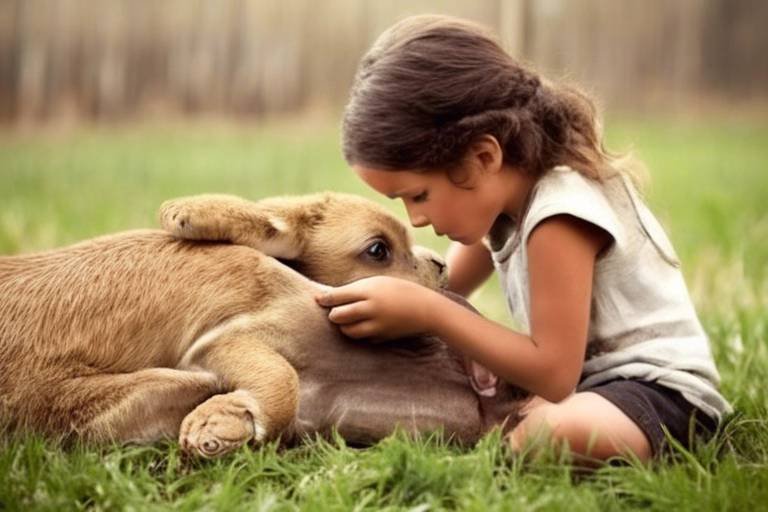The Impact of Pet Adoption on Public Health
Pet adoption is more than just a noble act of providing a home to an animal in need; it has profound implications for public health. In a world where mental health issues, physical inactivity, and social isolation are increasingly prevalent, the role of pets as companions and caregivers cannot be overstated. Adopting a pet can transform lives, not just for the animals but also for their human counterparts. The bond formed between humans and their pets fosters a unique relationship that can lead to enhanced mental, physical, and social well-being.
Imagine coming home after a long day, feeling the weight of the world on your shoulders. You open the door, and there’s your furry friend, tail wagging, eyes sparkling with joy. In that moment, all your worries seem to fade away. This is the magic of pet adoption. It’s not just about having a pet; it’s about having a companion who offers unconditional love and support. This emotional connection can significantly reduce feelings of loneliness and depression, making pet adoption a powerful tool for improving mental health.
Moreover, the benefits of pet adoption extend beyond emotional support. Owning a pet encourages a more active lifestyle. Regular walks, playtime, and outdoor activities not only keep pets happy but also promote physical health for their owners. Studies have shown that pet owners tend to have lower blood pressure, reduced cholesterol levels, and a lower risk of heart disease. The simple act of walking a dog can turn into a daily exercise routine that improves cardiovascular health and combats obesity.
Pets also play a critical role in stress reduction. When we interact with animals, our bodies release oxytocin, a hormone that fosters bonding and reduces stress. Just petting a dog or cat can lower cortisol levels, leading to a more relaxed state of mind. In high-stress environments, such as hospitals or nursing homes, therapy animals can provide comfort and emotional support, enhancing the healing process for patients. The presence of these furry companions can transform sterile, intimidating spaces into warm, welcoming environments.
For children, growing up with pets can be particularly beneficial. Pets teach kids valuable life lessons about empathy, responsibility, and nurturing. Caring for an animal instills a sense of compassion and helps develop social skills that are crucial for healthy interpersonal relationships. The responsibility of feeding, grooming, and playing with a pet can be a significant part of a child's development, shaping them into caring and responsible adults.
In addition to individual benefits, pets can also foster social connections among their owners. Taking a dog to the park or participating in pet-related events can serve as social catalysts, leading to friendships and community ties. This social interaction can significantly reduce feelings of isolation and loneliness, creating a more connected and supportive community.
However, it’s essential to acknowledge that pet adoption comes with its own set of challenges. While the benefits are numerous, prospective pet owners must consider the financial and time commitments involved. Owning a pet requires a stable financial investment, including costs for food, veterinary care, and grooming. Potential adopters should prepare for these expenses and ensure they can provide a stable environment for their new furry friend.
Additionally, pets require daily care, attention, and training. This commitment can be time-consuming, and it’s crucial for prospective pet owners to assess whether they can dedicate the necessary time to ensure their pet’s well-being. Just as a child needs nurturing and guidance, so does a pet. Understanding these responsibilities is essential for successful pet ownership and ensuring that both the pet and owner thrive in their relationship.
- What are the mental health benefits of pet adoption? Pets can reduce feelings of loneliness and depression, providing emotional support and companionship.
- How do pets contribute to physical health? Owning a pet encourages regular physical activity, leading to improved cardiovascular health and lower obesity rates.
- Can pets help with stress reduction? Yes, interacting with pets has been shown to lower cortisol levels and increase serotonin, which can significantly reduce stress and anxiety.
- What responsibilities come with pet ownership? Pet owners must consider financial costs, time commitments, and the daily care required for their pets.
- How do pets affect children's development? Children who grow up with pets often develop better social skills, empathy, and a sense of responsibility.

The Mental Health Benefits of Pet Adoption
Adopting a pet is not just about bringing a furry friend into your home; it’s about enriching your life in ways you might not even realize. The companionship of animals can significantly improve mental health by reducing feelings of loneliness and depression. Imagine coming home after a long day, feeling the weight of the world on your shoulders, and then being greeted by a wagging tail or a gentle purr. That instant connection can uplift your spirits and create a sense of belonging.
Research has shown that pet ownership fosters emotional support and can enhance overall well-being. For many, pets become a source of unconditional love and comfort. They don’t judge, they don’t criticize, and they are always there to listen without interrupting. This bond can be especially beneficial for individuals who struggle with mental health issues. The presence of a pet can provide a sense of purpose and routine, which are crucial for maintaining mental stability.
Moreover, the act of caring for a pet can lead to a significant reduction in stress levels. When you pet your dog or cuddle with your cat, your body releases oxytocin, often referred to as the "love hormone." This hormone promotes feelings of happiness and reduces anxiety. A study published in the Journal of Personality and Social Psychology found that pet owners reported lower levels of stress and higher levels of happiness compared to non-pet owners. Isn’t that fascinating?
Pets can also act as social catalysts, helping their owners connect with others. Whether it’s meeting fellow dog owners at the park or bonding with neighbors over shared experiences of pet care, these interactions can lead to stronger community ties and reduced feelings of isolation. For many people, the simple act of walking a dog can spark conversations and friendships, turning previously lonely walks into social outings.
It’s important to note that the benefits of pet adoption extend beyond just the individual. Children who grow up with pets often develop better social skills and empathy. The responsibility of caring for an animal teaches valuable life lessons about compassion and nurturing. These lessons can have a lasting impact on their emotional development, making them more understanding and caring individuals as they grow up.
In summary, the mental health benefits of pet adoption are profound and multifaceted. From reducing loneliness and anxiety to fostering social connections and teaching empathy, pets play a vital role in enhancing our emotional well-being. So, if you’re considering adopting a pet, remember that you’re not just giving an animal a home; you’re also opening the door to a happier, healthier you.
- How can pets help with anxiety? Pets provide companionship and emotional support, which can help reduce feelings of anxiety and promote relaxation.
- What types of pets are best for mental health? While dogs and cats are popular, smaller pets like rabbits and guinea pigs can also provide emotional benefits.
- Do pets help with depression? Yes, the companionship of pets can alleviate symptoms of depression by providing routine, purpose, and unconditional love.
- Can pets improve social skills? Absolutely! Pets can help facilitate social interactions, making it easier for owners to connect with others.

The Physical Health Advantages of Owning Pets
When you think about pets, what often comes to mind? Cuddly companions, wagging tails, and those adorable little faces that just melt your heart, right? But did you know that owning a pet can also be a game-changer for your physical health? Yes, it’s true! From encouraging you to get off the couch to helping you maintain a healthier lifestyle, pets can have a profound impact on our physical well-being.
One of the most significant advantages of pet ownership is the increased level of physical activity that comes with it. Whether it’s taking your dog for a walk, playing fetch in the park, or even just chasing after a playful cat, these activities can lead to improved cardiovascular health. Regular exercise is essential for maintaining a healthy weight and can significantly lower the risk of chronic diseases such as heart disease and diabetes. In fact, studies have shown that pet owners are more likely to meet their daily exercise requirements compared to non-pet owners.
But that’s not all! The mere act of walking your dog can help you burn calories and improve your overall fitness level. For instance, did you know that a brisk 30-minute walk with your furry friend can burn approximately 150-200 calories? That’s like burning off that slice of pizza you just couldn’t resist! Here’s a quick look at some of the physical health benefits you can gain from owning a pet:
| Benefit | Description |
|---|---|
| Increased Exercise | Regular walks and playtime can help you stay active and fit. |
| Lower Blood Pressure | Spending time with pets can reduce stress and lower blood pressure. |
| Improved Heart Health | Pet owners often have lower cholesterol levels and reduced triglycerides. |
In addition to physical activity, pets can also play a crucial role in stress reduction. Interacting with animals has been scientifically proven to lower cortisol levels, which is the hormone responsible for stress. When you pet your dog or cuddle with your cat, your body releases feel-good hormones like serotonin and oxytocin. This not only makes you feel happier but also contributes to a healthier heart and immune system. It’s like having a personal therapist that’s always there for you, ready to listen without judgment!
Moreover, owning a pet can lead to a more structured routine. Pets thrive on consistency, which means that their feeding and exercise schedules can help you develop a more disciplined lifestyle. This structure can be particularly beneficial for those who struggle with maintaining a healthy routine. Imagine waking up each day with a purpose, knowing that your furry friend is counting on you for their daily walks and playtime!
So, if you’re considering adding a pet to your family, remember that it’s not just about companionship; it’s also about improving your physical health. The bond you create with your pet can lead to a more fulfilling and active lifestyle, making every day an adventure. After all, who wouldn’t want a loyal friend by their side, encouraging them to get out and enjoy life?
- How often should I walk my dog? Aim for at least 30 minutes of exercise daily, split into two walks if necessary.
- Can pets really help with stress? Yes! Interacting with pets can lower stress hormones and increase feelings of happiness.
- What are the best pets for physical activity? Dogs are typically the best companions for physical activity, but active cats can also keep you on your toes!
The Role of Pets in Stress Reduction
This article explores the various ways in which pet adoption contributes to public health, examining mental, physical, and social benefits, as well as the challenges and responsibilities that come with pet ownership.
Adopting pets can significantly improve mental health by reducing feelings of loneliness and depression. The companionship of animals fosters emotional support and can enhance overall well-being.
Pet ownership encourages physical activity through regular walks and playtime. This increased activity can lead to improved cardiovascular health and lower obesity rates among pet owners.
Have you ever noticed how just petting a dog can melt your stress away? Interacting with pets has been scientifically proven to lower cortisol levels, the hormone primarily responsible for stress. This physiological response is not just a fleeting feeling; it has real implications for our mental health. When we engage with our furry friends, our bodies release serotonin, a neurotransmitter that contributes to feelings of happiness and well-being. It's like receiving a warm hug from a loved one, but this time, it's from your pet!
Consider this: when you come home after a long day, the sight of your pet wagging its tail or purring contentedly can instantly lift your spirits. This unconditional love and companionship can serve as a buffer against the stresses of daily life. Studies have shown that pet owners often report feeling less anxious and depressed than those who do not have pets. In fact, a survey revealed that over 70% of pet owners attribute their emotional well-being to their pets.
Moreover, the simple act of spending time with a pet can create a calming atmosphere. Whether it’s playing fetch in the park or snuggling on the couch, these moments of joy can significantly reduce stress levels. It's as if pets have a magical ability to sense our emotions and respond with love and affection, reminding us to take a break and enjoy the little things in life.
In addition to the individual benefits, pets can also enhance our social interactions. For instance, dog owners often find themselves engaging with other dog owners during walks or at dog parks. This social aspect can lead to meaningful connections, further alleviating feelings of isolation and stress. It's a win-win situation!
So, next time you're feeling overwhelmed, consider spending some quality time with your pet. Not only will it provide you with a much-needed break, but it will also contribute positively to your mental health. In a world that often feels chaotic, pets remind us to slow down and appreciate the simple joys of life.
While adopting pets has many benefits, it also comes with challenges such as financial costs and time commitments. Understanding these responsibilities is essential for successful pet ownership.
Owning a pet involves expenses like food, vet visits, and grooming. Potential adopters should be aware of these costs before making a commitment.
Pets require daily care, attention, and training. Prospective pet owners must consider whether they can dedicate the necessary time to ensure their pet's well-being.
- How can pets help reduce stress? Pets provide companionship and unconditional love, which can help lower cortisol levels and increase serotonin, leading to reduced stress.
- What types of pets are best for mental health? Dogs and cats are often recommended for their ability to bond with humans, but other pets like rabbits and birds can also provide emotional support.
- Are there any downsides to pet ownership? Yes, pet ownership comes with financial costs and requires a significant time commitment for care and training.
Pets as Therapy Animals
Have you ever walked into a hospital room and felt an instant sense of calm wash over you? That’s often thanks to the presence of therapy animals. These amazing pets are not just cute companions; they play a vital role in enhancing the emotional and psychological well-being of individuals in various settings. From hospitals to nursing homes, therapy animals provide comfort and support to those in need, acting as a bridge to healing and recovery.
Research has shown that interacting with therapy animals can lead to a significant reduction in stress and anxiety levels. It’s fascinating how a simple wag of a tail or a soft purr can elevate someone’s mood. For many patients, the presence of a therapy animal can make a daunting hospital stay feel a little less intimidating. Imagine being in a sterile, cold environment, and then suddenly, a friendly dog comes to visit. It’s like a burst of sunshine breaking through the clouds!
Therapy animals are specially trained to offer emotional support and companionship. They are often used in therapeutic settings to help patients cope with various conditions, including depression, PTSD, and chronic pain. The bond that forms between a patient and a therapy animal can be incredibly profound, often leading to improved patient outcomes. According to studies, patients who interact with therapy animals often report feeling less pain and experiencing faster recovery times. This is a testament to the healing power of pets.
Here’s a quick look at some of the benefits of therapy animals:
- Emotional Support: They provide a sense of companionship and reduce feelings of loneliness.
- Stress Reduction: Interacting with animals lowers cortisol levels, promoting relaxation.
- Social Interaction: They can encourage communication and socialization among patients.
- Physical Activity: Engaging with pets can motivate individuals to move more, which is beneficial for physical health.
Moreover, therapy animals are not limited to just dogs and cats; a variety of animals can serve in this capacity, including rabbits, birds, and even miniature horses. Each of these animals brings unique qualities that can help different individuals in various ways. For example, a gentle rabbit might be ideal for someone who is anxious and needs a calming presence, while a playful dog could be perfect for encouraging movement and activity.
In conclusion, therapy animals are more than just adorable faces; they are lifesavers in many respects. They provide emotional support, facilitate healing, and enhance the quality of life for countless individuals. If you ever have the chance to interact with a therapy animal, take a moment to appreciate the incredible bond that exists between humans and their furry companions. It’s a beautiful reminder of how pets can profoundly impact our lives.
Here are some common questions regarding therapy animals:
- What qualifies an animal to be a therapy animal? Therapy animals must undergo specific training and certification to ensure they can provide comfort and support in therapeutic settings.
- Can any pet be a therapy animal? While many pets can provide emotional support, only those that meet training and certification requirements can be considered therapy animals.
- How can I get involved with therapy animals? You can volunteer with organizations that train therapy animals or even consider training your own pet if they have the right temperament.
Impact on Children's Development
When it comes to children's development, pets can play a transformative role that goes far beyond simple companionship. Imagine a child growing up with a furry friend by their side, learning to navigate the world with a loyal companion. The presence of pets in a child’s life can significantly enhance their emotional and social skills. For instance, interacting with animals helps children develop empathy and compassion, as they learn to understand and respond to the needs of their pets. This nurturing aspect is crucial in shaping their ability to relate to others, fostering meaningful relationships throughout their lives.
Moreover, the responsibility that comes with pet ownership teaches children valuable life lessons. They learn about commitment, as pets require consistent care, feeding, and attention. This responsibility can be a great way to instill a sense of accountability in young minds. For instance, a simple daily task like walking a dog can serve as a reminder of the importance of routine and reliability. Children who engage in such activities often develop a stronger sense of self-discipline, which can translate into other areas of their lives, such as academics and personal relationships.
Additionally, pets can serve as a bridge to social interactions. Children with pets often find it easier to connect with their peers, as pets can be a common topic of conversation. They can also facilitate playdates and social gatherings, creating opportunities for children to build friendships. For example, a child who brings their dog to the park may find themselves engaging with other kids who also have pets, fostering a sense of community and belonging. This social aspect is particularly important in an age where digital interactions are becoming more prevalent, as it encourages face-to-face communication and relationship building.
Furthermore, studies have shown that children who grow up with pets often exhibit lower levels of anxiety and stress. The unconditional love and affection that pets provide can create a safe space for children to express their emotions. This emotional support is vital during formative years, as it helps children navigate challenges and develop resilience. In essence, pets can be seen as a therapeutic presence, offering comfort during tough times and teaching children how to cope with their feelings.
In summary, the impact of pets on children’s development is profound and multifaceted. From teaching responsibility and empathy to enhancing social skills and emotional well-being, pets are more than just animals; they are integral members of the family that contribute to a child’s growth and happiness. As parents consider the addition of a furry friend to their household, they should keep in mind the myriad of benefits that accompany pet ownership, not only for their children but for the entire family unit.
- What are the benefits of having a pet for children? Pets can help children develop empathy, responsibility, and social skills while providing emotional support.
- How do pets impact children's mental health? Pets can reduce anxiety and stress levels in children, offering a sense of security and comfort.
- What responsibilities do children have when caring for a pet? Children can help with feeding, walking, grooming, and providing companionship to their pets.
- Can pets help children with social interactions? Yes, pets can serve as social catalysts, making it easier for children to connect with their peers.
Pets and Loneliness: A Social Connection
In our fast-paced world, feelings of loneliness can creep in when we least expect it. It’s almost as if loneliness has become a silent epidemic, affecting people of all ages. But here's where our furry friends come into play! Pets have a remarkable ability to bridge the gap between isolation and connection. They don’t just fill our homes; they fill our hearts and lives with joy, laughter, and companionship. Imagine coming home after a long day to a wagging tail or a gentle purr. It’s like having a little cheerleader waiting to celebrate your return!
Studies have shown that pet ownership can significantly reduce feelings of loneliness. The bond that forms between humans and animals is something truly special. Pets provide unconditional love and companionship, making them excellent antidotes to loneliness. They are always there to listen, cuddle, and offer support without judgment. This emotional connection can be particularly beneficial for those who live alone or are going through tough times.
Moreover, pets can act as social catalysts. They can help break the ice in social situations, making it easier for their owners to connect with others. For instance, dog owners often find themselves chatting with fellow dog lovers at parks or during walks. This simple act of sharing a common interest can lead to lasting friendships. It's fascinating how a shared love for animals can create bonds that might not have formed otherwise.
Here are a few ways pets foster social connections:
- Shared Activities: Taking your dog for a walk or attending a pet-friendly event can introduce you to new people.
- Community Involvement: Many communities host pet-related activities, such as dog shows or adoption events, where pet owners can meet and socialize.
- Support Groups: Pet owners often form or join groups focused on pet care, which can lead to friendships and a sense of belonging.
In essence, pets not only provide companionship but also encourage social interactions that can enhance our lives. They remind us that we are not alone in this vast world. So, whether it's a playful puppy or a serene cat, these animals can help us forge connections that combat loneliness, making our lives richer and more fulfilling. In a way, pets are like little furry therapists, always ready to lend an ear or a paw when we need it most.
Q1: How do pets help reduce feelings of loneliness?
A1: Pets provide companionship and unconditional love, which can significantly alleviate feelings of loneliness. Their presence can create a sense of purpose and routine, helping owners feel more connected.
Q2: Can pets help me make new friends?
A2: Absolutely! Pets can act as social catalysts, making it easier to meet new people through shared activities, such as walks or pet events.
Q3: What types of pets are best for reducing loneliness?
A3: While dogs and cats are the most common companions, any pet that fits your lifestyle can help reduce loneliness. Consider smaller animals like rabbits, guinea pigs, or even fish, depending on your living situation.

Challenges of Pet Adoption
While the joy of welcoming a furry friend into your home is undeniable, pet adoption comes with its own set of challenges that potential pet owners need to consider. It's like jumping into a thrilling adventure; it’s exciting but requires preparation and commitment. The reality is that adopting a pet isn't just about providing a loving home; it also involves a range of responsibilities that can sometimes feel overwhelming.
One of the most significant challenges is the financial commitment. Owning a pet isn't just about the initial adoption fee; there are ongoing expenses that can add up quickly. For example, consider the following costs:
| Expense Type | Estimated Monthly Cost |
|---|---|
| Food | $30 - $100 |
| Veterinary Care | $50 - $200 |
| Grooming | $20 - $80 |
| Supplies (toys, bedding, etc.) | $10 - $50 |
As you can see from the table, the costs can vary significantly depending on the type of pet you adopt. For instance, a large dog generally requires more food and care than a small cat. This financial aspect can be daunting, especially for first-time pet owners who might not have fully anticipated the ongoing costs of pet care.
Another challenge lies in the time commitment required for pet care. Pets thrive on companionship and need daily interaction, exercise, and training. Imagine having a toddler who never grows up; that’s what a pet can feel like! They rely on you for everything—from feeding and grooming to socialization and medical care. If you have a busy lifestyle, it’s crucial to assess whether you can dedicate the necessary time to your new furry friend.
Moreover, pets can sometimes bring unforeseen challenges. For instance, they may have behavioral issues that require additional training or socialization. Some pets may also have health problems that necessitate frequent vet visits, which can be both time-consuming and costly. It’s essential to be prepared for these potential hurdles before making the leap into pet ownership.
Lastly, there’s the emotional aspect of pet adoption. While the bond with a pet can be incredibly rewarding, it also comes with the possibility of loss. Pets have a shorter lifespan than humans, and the thought of losing a beloved companion can be heart-wrenching. This emotional investment is something potential adopters should consider seriously.
In summary, while pet adoption brings numerous benefits, it’s crucial to weigh these against the challenges. By understanding the financial, time, and emotional commitments involved, you can make an informed decision that ensures both you and your future pet lead happy, fulfilling lives together.
Financial Considerations of Pet Ownership
When it comes to adopting a pet, many people often overlook one of the most crucial aspects: the financial commitment. Owning a pet is not just about providing love and companionship; it also involves a variety of expenses that can add up significantly over time. Before you bring a furry friend into your home, it’s essential to understand these costs to ensure you're fully prepared for the responsibilities that come with pet ownership.
First and foremost, let’s talk about the basic necessities. Pets require food, which can vary widely in price depending on the type and brand you choose. For instance, high-quality dog or cat food can cost anywhere from $20 to $100 per month, depending on your pet's size and dietary needs. Additionally, you’ll need to budget for regular veterinary check-ups, vaccinations, and preventive care, which can easily run between $100 and $300 annually. Here's a quick breakdown of some common expenses:
| Expense Category | Estimated Cost (Annually) |
|---|---|
| Food | $240 - $1200 |
| Veterinary Care | $100 - $300 |
| Grooming | $50 - $500 |
| Pet Supplies (toys, bedding, etc.) | $50 - $200 |
| Pet Insurance | $300 - $600 |
Moreover, if you plan on traveling or working long hours, you may need to consider additional costs such as pet sitting or boarding services, which can range from $25 to $50 per day. These expenses can quickly escalate, especially if you travel frequently.
Another important factor to consider is pet insurance. While this might seem like an unnecessary expense, it can be a lifesaver in case of unexpected health issues. Insurance can cost between $20 and $50 monthly, but it provides peace of mind knowing that you won't be faced with exorbitant vet bills in an emergency.
Lastly, it’s crucial to factor in the time commitment alongside financial considerations. Pets require daily attention, exercise, and training, which means you need to be available to meet their needs. The responsibility of caring for a pet extends beyond just the financial aspect; it’s about ensuring their happiness and well-being.
In summary, while adopting a pet can be one of the most rewarding experiences of your life, it’s vital to approach it with a clear understanding of the financial implications. By preparing for these costs, you can ensure that you provide a loving and stable home for your new companion, making the adoption experience a fulfilling one for both you and your pet.
- What are the average costs of owning a pet?
The costs can vary significantly depending on the type of pet, but generally, you should budget for food, veterinary care, grooming, and supplies, which can total anywhere from $500 to $2,000 annually. - Is pet insurance worth it?
Yes, pet insurance can save you a lot of money in case of emergencies or unexpected health issues, making it a worthwhile investment for many pet owners. - How can I save money on pet care?
Consider adopting from shelters, buying in bulk, or looking for local clinics that offer discounted services to help manage costs.
Time and Commitment Required for Pet Care
Owning a pet is not just about having a furry companion to cuddle with; it’s a serious commitment that requires time and dedication. Just like a child, pets depend on their owners for everything—from food and shelter to love and attention. Imagine coming home after a long day at work and your dog is eagerly waiting at the door, tail wagging, ready to greet you. That moment is heartwarming, but it also comes with the responsibility of ensuring that your pet's needs are met.
First and foremost, pets require daily care. This includes feeding them, taking them for walks, grooming, and providing mental stimulation through play. For instance, dogs need at least one to two walks a day, depending on their breed and energy level. This not only helps them burn off energy but also keeps them healthy and happy. A lack of physical activity can lead to behavioral issues, making it crucial for pet owners to carve out time in their schedules for these activities.
Moreover, pets thrive on routine. Establishing a consistent schedule for feeding, exercise, and training can greatly benefit both the pet and the owner. It creates a sense of stability for the animal and helps the owner manage their time effectively. For example, you might decide to feed your pet in the morning and evening, with walks in between. This structure not only helps in building a strong bond but also ensures that your pet feels secure and loved.
Additionally, training is an essential aspect of pet care that requires a significant time investment. Training sessions should be short but frequent, ideally lasting about 5-10 minutes several times a day. This helps your pet learn commands and good behavior without becoming overwhelmed. Remember, patience is key! Just like teaching a child, you may need to repeat commands several times before they stick.
Furthermore, let’s not forget about the financial commitment that comes with pet ownership. While the emotional rewards are priceless, the costs can add up quickly. Regular vet visits, vaccinations, and unexpected health issues can drain your wallet. It’s wise to budget for these expenses to ensure you can provide the best care for your furry friend. Here’s a simple breakdown of potential monthly costs:
| Expense | Estimated Monthly Cost |
|---|---|
| Food | $30 - $100 |
| Vet Visits (average) | $20 - $50 |
| Grooming | $10 - $50 |
| Supplies (toys, litter, etc.) | $10 - $30 |
| Total | $80 - $280 |
In conclusion, the joys of pet ownership come with responsibilities that should not be taken lightly. It’s essential for potential pet owners to assess their lifestyle, availability, and financial situation before making the commitment. Remember, your pet is not just a companion; they are a part of your family, and they deserve the same love and care that you would give to any loved one.
- How much time should I dedicate to my pet each day?
It’s recommended to spend at least 1-2 hours daily on walks, playtime, feeding, and training. This ensures that your pet remains happy and healthy.
- What are the main financial costs of owning a pet?
The main costs include food, vet visits, grooming, and supplies. It's important to budget for these expenses to avoid unexpected financial strain.
- Can I adopt a pet if I have a busy lifestyle?
While it's possible, it's crucial to ensure that you have enough time to dedicate to your pet’s needs. Consider adopting a pet that requires less attention, or look into pet-sitting services.
Frequently Asked Questions
- What are the mental health benefits of pet adoption?
Adopting a pet can significantly enhance your mental well-being. Pets provide companionship, which helps reduce feelings of loneliness and depression. The emotional support animals offer can boost your overall happiness and foster a sense of belonging.
- How do pets contribute to physical health?
Owning a pet encourages you to be more active. Regular walks and playtime with your furry friend can lead to better cardiovascular health and help lower obesity rates. It's like having a personal trainer who never gets tired!
- Can pets help reduce stress?
Absolutely! Interacting with pets can lower cortisol levels and increase serotonin, which helps reduce stress and anxiety. Just a few minutes of cuddling or playing with your pet can significantly lighten your mood.
- What role do therapy animals play?
Therapy animals provide vital emotional support in settings like hospitals and nursing homes. Their presence can enhance healing and improve patient outcomes, making them invaluable companions during tough times.
- How do pets impact children's development?
Children who grow up with pets often develop better social skills and empathy. Caring for an animal teaches them important life lessons about responsibility, compassion, and nurturing, which are essential for their growth.
- Can pets help combat loneliness?
Definitely! Pets can act as social catalysts, helping their owners connect with others. This can lead to stronger community ties and help reduce feelings of isolation, creating a more vibrant social life.
- What are the financial considerations of pet ownership?
Owning a pet comes with various expenses, including food, veterinary care, and grooming. It's crucial for potential adopters to be aware of these costs to ensure they can provide a stable and loving home for their new friend.
- How much time do I need to dedicate to pet care?
Pets require daily care, attention, and training. Before adopting, it's essential to consider whether you can commit the necessary time to ensure your pet's well-being and happiness. They depend on you for their care!



















